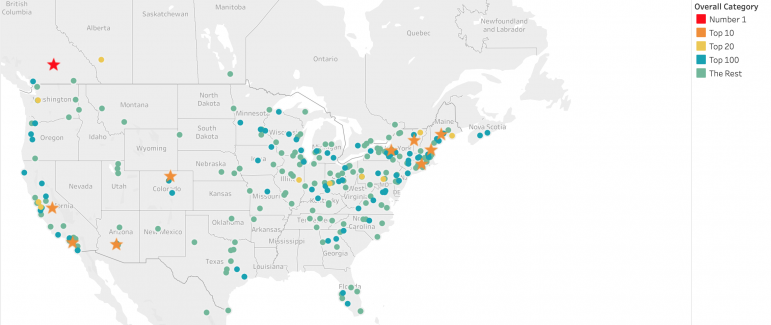By HELEN KORNEFFEL
Capital News Service
LANSING — Three Michigan universities were recently ranked among the U.S. and Canada’s greenest colleges by different organizations.
The Princeton Review listed Michigan State University (19th) and Grand Valley State University (38th) among its top 50. The Sierra Club ranked Grand Valley (59th), Michigan State (66th) and the University of Michigan (71st) among its top 100.
Elsewhere in the Great Lakes region, the Princeton Review ranked the SUNY College of Environmental Science and Forestry second in the nation. The Sierra Club placed the same institution third, and ranked the University of Wisconsin-Milwaukee 92nd.
“Being ranked on both the lists means so much to me because it represents the work of so many people across campus,” said Yumi Jakobcic, director of Grand Valley’s Office of Sustainability Practices. “Our office can’t take credit for all of that because we have people all over working very hard on sustainability.”
The Princeton Review and the Sierra Club both use the STARS — Sustainability Tracking, Assessment & Rating System — as criteria for their rankings. The STARS ranking comes from the Association for the Advancement of Sustainability in Higher Education. Schools must have a valid STARS 2.0 or 2.1 rating of bronze, silver, gold or platinum to be considered in the ranking on both lists.
The STARS rating is used by over 800 schools in 30 countries. STARS participants report achievements in academics, engagement, operations, planning and administration, and innovation and leadership.
Michigan State moved from a silver to a gold STARS rating in 2019.
That’s what leveraged it into the Princeton Review top 50, said Amy Butler, director of campus sustainability for Michigan State.
“It wouldn’t be an understatement to say I’m ecstatic to be in the top 50,” Butler said. “Over 200 people were involved in actually providing the data to support the application that we submitted.”
The Princeton Review also asks for student surveys to see how sustainability issues influence their education and life on campus. The surveys also measure student support for environmental awareness and conservation efforts and the visibility and impact of student environmental groups.
“This is a moment of pride for me,” said Andrea Bair, the student sustainability liaison with Michigan State’s undergraduate government. “I think it shows that Spartans are going to be the most prepared going into the workforce and that MSU is on the forefront of this sustainability movement.”
Michigan State seniors Alexa Marsh and Ethan Jodoin promote sustainability while active in Sustainable Spartans, a campus club.
“As the first land grant institution in the nation, it’s important to recognize that MSU has a moral imperative to help others become more sustainable,” Jodoin said. “Seeing that we are at the front of the green movement is really important to me as a sustainability student.”
The University of Wisconsin-Milwaukee also has a gold STARS rating and ranked #7 by the Princeton Review for building sustainability practices in 2019. The campus is six blocks from Lake Michigan and prides itself on its School of Freshwater Sciences, the nation’s only graduate school dedicated solely to studying freshwater.
“Everything about Milwaukee and UWM is water, water, water,” said Katherine Nelson, chief sustainability officer of the University of Wisconsin-Milwaukee. “It’s great to have a sustainability program where our connection to the Great Lakes is very apparent and aware and where the importance of our stewardship is seen throughout the institution.”
Grand Valley recently had an environmental studies and sustainability major approved as a new degree program. Students expressed interest in the program when it was offered as a minor, and now that it is a major, it is the fastest growing major at the university, Jakobcic said.
“We are just so fortunate to live near the Great Lakes,” Jakobcic said. “It’s just such an amazing resource, and I think we need to be good stewards of it and help it stay this lovely and more lovely for future generations.”
See the Sierra Club list at: https://www.sierraclub.org/sierra/cool-schools-2019/cool-schools-2019-full-ranking and the Princeton Review list at https://www.princetonreview.com/college-rankings?rankings=top-50-green-colleges
Helen Korneffel is a reporter for Great Lakes Echo.
